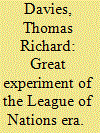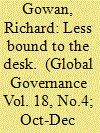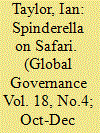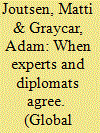|
|
|
Sort Order |
|
|
|
Items / Page
|
|
|
|
|
|
|
| Srl | Item |
| 1 |
ID:
117798


|
|
|
|
|
| Publication |
2012.
|
| Summary/Abstract |
When future historians consider the global governance role of the G8, they would do well to consider its approach to Africa. For the first decade of the new millennium, G8 summits sustained an extraordinary focus on the continent. Responding to African governments' proposed New Partnership for Africa's Development (NEPAD), G8 governments produced a succession of agreements and initiatives, anchored by the 2002 Africa Action Plan and the 2005 Gleneagles declaration on Africa and development. These initiatives were framed by a motif of "partnership." They provided elite impetus toward a more comprehensive "Third Way" bargain for Africa. Collectively, they illustrate some stark limits to designs for a transnationally hegemonic approach to global challenges. In consequence, they have contributed to the erosion of G8 purpose and legitimacy.
|
|
|
|
|
|
|
|
|
|
|
|
|
|
|
|
| 2 |
ID:
117800


|
|
|
|
|
| Publication |
2012.
|
| Summary/Abstract |
For the past ten years Germany's Africa policy has become more driven by the emerging international consensus formed in the United Nations and among the G8 member states but, more importantly, within the European Union on what the African continent's challenges are and how they should be approached. The multilateralization of Africa policy plays out on questions of trade, peace, and security and in the way that aid relations are generally conditioned to issues of democracy, good governance, and human rights. However, there remains a German "content" in many bilateral relations with African countries, which can be explained by the specific mix of policy instruments and development assistance actors that have their own institutional interests and path-dependent legacies in terms of priorities. Major changes of this particular mix between externally determined and internally driven elements of Africa policy are likely to be influenced by financial considerations, the future of European integration, and the way that German elites perceive changes in global governance architectures.
|
|
|
|
|
|
|
|
|
|
|
|
|
|
|
|
| 3 |
ID:
117796


|
|
|
|
|
| Publication |
2012.
|
| Summary/Abstract |
This article aims to shed historical light on the contemporary debate concerning the role of international nongovernmental organizations and intergovernmental organizations in the democratization of global governance through an assessment of the experience and political thought of the League of Nations era. After introducing the interactions of international nongovernmental organizations and intergovernmental organizations in the present day and in the League of Nations period and the contemporary debate on their role in the democratization of global governance, the article discusses how democracy in global governance was conceived in the League of Nations era, with particular reference to the work of Alfred Zimmern. The analysis highlights not only the considerable continuities between interwar thought and that of the present day, but also the potential problems identified at the time that remain pertinent today.
|
|
|
|
|
|
|
|
|
|
|
|
|
|
|
|
| 4 |
ID:
117795


|
|
|
|
|
| Publication |
2012.
|
| Summary/Abstract |
WHAT SORT OF DIPLOMATIC STRATEGIST IS BAN KI-MOON? SINCE BAN TOOK
office as Secretary-General of the United Nationsin 2007, there has been a
great deal of discussion about his personal diplomatic style. Until the Arab
Spring, he was typically characterized as an archetypal (though not always
effective) quiet diplomat. In January 2011, Human Rights Watch accused
Ban of having an "undue faith in his professed ability to convince by private persuasion" when dealing with repressive governments in cases such
as Myanmar, Sudan, and Sri Lanka.
1
As I argued in a previous article for
Global Governance, Ban's belief in diplomacy meant that he took too little
interest in peacekeeping during his first term leading the UN.
2
Since the
beginning of the Arab Spring, however, Ban appears to have lost some of
hisfaith in diplomatic niceties. He spoke out early in favor of the protestors
in Egypt, became a consistent supporter of military action in Libya, and
publicly condemned the Syrian regime's violence against civilians as early
as May 2011.
3
Asthe Syrian crisis deteriorated in 2012, Ban appointed first
his predecessor, Kofi Annan, and later the stalwart UN mediator Lakhdar
Brahimi as envoys to Damascus but repeatedly escalated his own criticism
of President Bashar Al-Assad.
|
|
|
|
|
|
|
|
|
|
|
|
|
|
|
|
| 5 |
ID:
117799


|
|
|
|
|
| Publication |
2012.
|
| Summary/Abstract |
Under New Labour, the British government was claimed to be operating under guidelines that sought to have an ethical dimension to British foreign policy. A particular focus of New Labour's foreign policy, rhetorically at least, was Africa. During this period, London sought to bring the G8 in line with London's claimed policies vis-à-vis the continent. However, upon closer analysis, vocal flourishes and presentations aside, policy was never adequately supported by, and in many respects was contradicted by, much of what Blair's government actually did in relation to Africa. The disparity between the high-profile media presentation of policy and what was actually delivered by Blair and company in Africa reflected a wider problem in the British polity that New Labour and its spin doctors came to symbolize.
|
|
|
|
|
|
|
|
|
|
|
|
|
|
|
|
| 6 |
ID:
117797


|
|
|
|
|
| Publication |
2012.
|
| Summary/Abstract |
The UN Convention Against Corruption is the only truly global convention in corruption control. Separate and rather difficult negotiations were conducted on a mechanism for the implementation of the treaty. These negotiations broke ground by providing, for the first time, peer review of a United Nations treaty. This article, which is based on the authors' close observations and interviews with key participants, seeks to show how the dynamics between technical experts and diplomats led to a resolution that would not have occurred if either the technical experts or the diplomats had acted alone.
|
|
|
|
|
|
|
|
|
|
|
|
|
|
|
|
|
|
|
|
|